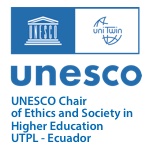Bioethics. Toward the Best Practices
Abstract
In 2005, the UNESCO Declaration on Bioethics and Human Rights defined a framework of universal principles. Because of their basic responsibility for applying the set of principles and also for promoting bioethical education, States were the main addressees of that document. Here the analysis is focused on the connection between normative framework and practices. (1) In clinical settings and in research, «what should be done» has to be translated into specific actions and «best practices» (2) These would be coherent with the normative framework, but they correspond to a different level. Moreover, ethics committees require an institutional framework.
Downloads
References
Alexy, Robert (1995). Recht, Vernunft, Diskurs. Frankfurt: Suhrkamp
Ausín, Txetxu (2019). «Buenas prácticas (codigos de)». Eunomia 15: pp. 239–248, https://doi.org/10.20318/eunomia.2018.4354.
García, Agustín (2013). «Pasado, presente y futuro de la Bioética en Ecuador». Revista Redbioética/UNESCO 8: pp. 65–69.
Gordijn, Bert y Henk Ten Have (2013). «Quandaries of Ethics Education». Medicine, Health Care and Philosophy 16: pp. 1–2. https://doi.org/10.1007/s11019-012-9457-x.
Ley 14/2007, de 3 de julio, de investigación biomédica. https://www.boe.es/buscar/pdf/2007/BOE-A-2007-12945-consolidado.pdf.
Ley 41/2002, de 4 de noviembre, básica reguladora de la autonomía del paciente y de derechos y obligaciones en materia de información y documentación clínica. https://www.boe.es/buscar/act.php?id=BOE-A-2002-22188.
López de la Vieja, Mª Teresa (2019). «Bioética. Contexto institucional». En: Bioética. Presente futuro, editado por Mª Teresa López de la Vieja. Madrid: Plaza y Valdés, pp. 45–62.
López de la Vieja, Mª Teresa (2010). La pendiente desbaladiza. La práctica de a argumentación moral. Madrid: Plaza y Valdés.
López de la Vieja, Mª Teresa (2010). Principios morales y casos prácticos. Madrid: Tecnos.
Ministerio de Salud (2017). Ley Orgánica de Salud de Ecuador. Ley 67. Registro Oficial Suplemento 423 de 22–dic.–2006. https://www.salud.gob.ec/wp-content/uploads/2017/03/LEY-ORG%C3%81NICA-DE-SALUD4.pdf.
OECD (2000). Trust in Government. Ethics Measures in OECD Countries. OECD: Paris.
The Nuremberg Code (1996). British Medical Journal 313: p. 1448. https://doi.org/10.1136/bmj.313.7070.1448.
Ten Have, Henk (2014). «Bioethics Education». En: Handbook of Global Bioethics, editado por Ten Have, Bert Gordijn. Dordrecht: Springer, pp. 447 –466.
Ten Have, Henk (2017). «Quality and Best Practices». International Journal of Ethics Education 2: pp. 1–2. https://doi.org/10.1007/s40889-017-0034-2.
Ten Have, Henk y Bert Gordijn (2012). «Broadening Education in Bioethics». Medicine, Health Care and Philosophy 15: pp. 99–101. https://doi.org/10.1007/s11019-012-9392-x.
The National Commission for the Protection of Human Subjects of Biomedical and Behavioral Research (1979). The Belmont Report. https://www.hhs.gov/ohrp/sites/default/files/the-belmont-report-508c_FINAL.pdf.
UNESCO (2008). On Consent. Report of the International Bioethics Committee of UNESCO (IBC). Paris https://unesdoc.unesco.org/ark:/48223/pf0000178124.
UNESCO (2006). Universal Declaration on Bioethics and Human Rights. Paris https://unesdoc.unesco.org/ark:/48223/pf0000146180.
World Medical Association (2001). «Declaration of Helsinki». Bulletin of the World Health Organization 79: pp. 373–374. https://www.who.int/bulletin/archives/79(4)373.pdf.
Copyright (c) 2019 © Analysis

This work is licensed under a Creative Commons Attribution-NonCommercial-NoDerivatives 4.0 International License.








